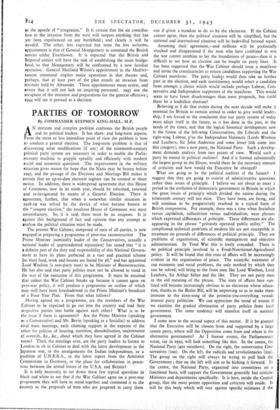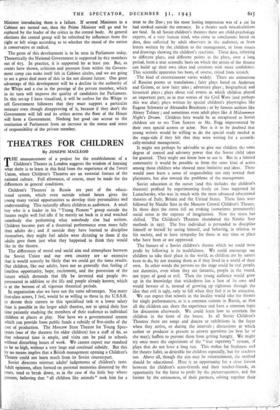PARTIES OF TOMORROW
By COMMANDER STEPHEN KING-HALL, M.P.
AN intricate and complex problem confronts the British people and its political leaders. It has short- and long-term aspects. From the more or less immediate point of view the problem is how to conduct a general election. The long-term problem is that of discovering what modifications (if any) of the nineteenth-century political party system are necessary in order to enable the Parlia- mentary machine to grapple speedily and efficiently with modem social and economic questions. The improvement in the military situation gives reason for hope that the Nazis may be beaten before 1945, and the passage of the Elections and Meetings Bill makes it certain that an up-to-date electoral register can be created at short notice. In addition, there is widespread agreement that this House of Commons, now in its ninth year, should be refreshed, renewed and re-invigorated by means of a General Election. There is agreement, further, that when a somewhat similar situation in 1918-19 was solved by the device of what became known as the " coupon election," the resultant House of Commons was most unsatisfactory. So, it is said, there must be no coupons. It is against this background of fact and opinion that any attempt to analyse the political situation must be made.
The present War Cabinet, composed of men of all parties, is now engaged in preparing a programme of post-war reconstruction The Prime Minister (nominally leader of the Conservatives, actually a national leader of unprecedented reputation) has stated that " it is a definite part of the duty and responsibility of this National Govern- ment to have its plans perfected in a vast and practical scheme [so that] food, work and houses are found for all," and has appointed Lord Woolton (a non-party man) to be Minister of Reconstruction. He has also said that party politics must not be allowed to stand in the way of the execution of this programme. It must be assumed that unless the War Cabinet breaks up because it cannot agree on post-war policy, it will produce a programme an outline of which may well have been foreshadowed in the Prime Minister's broadcast of a Four Year Plan. From that what follows?
Having agreed on a programme, are the members of the War Cabinet to be expected to go out into the country and lead their respective parties into battle against each other? What is to be the issue if there is agreement? Are the Prime Minister (speaking as a Conservative) and Mr. Bevin (speaking as a Socialist) to address rival mass meetings, each claiming support at the expense of the other for policies of housing, nutrition, demobilisation, maintenance of controls, &c., &c., about which they have agreed in the Cabinet room? Then, the meetings over, are the party leaders to hasten to London to sit in Cabinet to deal with the latest development in the Japanese war, or the arrangements for Indian independence, or a problem of U.N.R.R.A., or the latest report from the Armistice Commission in Germany, or the plans for collaboration in peace- time between the armed forces of the U.S.A. and Britain?
It is only necessary to set down these few typical questions in black and white to see that if the War Cabinet agree on a post-war programme they will have to stand together and commend it to the country as the proPosals of men who are prepared to carry them out if given a mandate to do so by the electorate. If the Cabinet cannot agree, then the political situation will be simplified, but the national and international situation will be bedevilled beyond repair.
Assuming their agreement,—and millions will be profoundly shocked and disappointed if the men who have combined to win the war cannot combine to lay the foundations of peace—then it is difficult to see how an election can be fought on party lines. It has been suggested that the War Cabinet should issue a manifesto and invite the constituencies to return candidates supporting the War Cabinet manifesto. The party leadeEs would then take no further part in the election, and each constituency would select a candidate from amongst a choice which would include perhaps Labour, Con- servative and Independent supporters of the manifesto. This would seem to have fewer disadvantages than most proposals, but could there be a leaderless election?
Believing as I do that events during the next decade will make it essential for Britain to remain united in order to give world leader- ship, I am forced to the conclusion that our party system of today must adapt itself in the future, as it has done in the past, to the needs of the times, and that the logical historical development now is the fusion of the left-wing Conservatives, the Liberals and the right wing Labour, plus the Independent Nationals (Lords Wootton and Leathers, Sir John Anderson and some lesser folk come into this category), into a new party, the National Party. Such a develop- ment demands analysis from two points of view. Would such a party be rooted in political realities? And if it formed substantially the largest group in the House, would there be the necessary amount of criticism and how would the Executive be changed?
What are going to be the political realities of the future? I suggest that they are going to consist of administrative questions rather than issues of principle. I believe we are about to enter a period in the evolution of democratic government in Britain in which the great issues of principle which divided the nation during the nineteenth century will not exist. They have been, are being, and will continue to be progressively resolved in a typical form of British compromise. For example, there was a time when Socialism versus capitalism, collectivism versus individualism, were phrases which expressed differences of principle. These differences are dis- appearing in the phrase " privately operated public utility." The complicated technical problems of modern life are not susceptible to treatment on grounds of differences of political principle. They are problems of organisation, of scientific management, and objective administration. In Total War this is freely conceded. There is no political principle involved in a Food-Nutritional-Agricultural policy. It will be found that this state of affairs will be increasingly evident in the organisation of peace. The scientific treatment of our economic and social problems, the only method by which they can be solved, will bring to the front men like Lord Woolton, Lord Leathers, Sir Arthur Salter and the like. They are not party men in the old meaning of the phrase. The state of affairs here out- lined will become increasingly obvious to an electorate whose educa- tion, thanks- to the Butler Bill, will be improving so as to make them immune to the siren-song of the promise-you-everything vested- interest party politician. We can appreciate the trend of events if we examine the gradual elimination of party politics from local government. The same tendency will manifest itself in national government.
I come now to the second aspect of this matter. If it be granted that the Executive will be chosen from and supported by a large centre party, where will the Opposition come from and where is the alternative government? As I foresee events, the Parliamentary scene, say in 1950, will look something like this. In the centre, the National Party (400 members). On the right, the conservative C,on- servatives (too). On the left, the radicals and revolutionaries (too). The group on the right will always be trying to pull back the Government ; that on the left will aim to be kicking it forward. In the centre, the National Party, organised into committees on a functional basis, will support the Government generally but criticise Ministers and departments specifically. It is here, inside the Central group, that the most potent opposition and criticism will reside. It will be this body which will vote against specific estimates if the Minister introducing them is a failure. If several Ministers in a Cabinet are turned out, then the Prime Minister will go and be replaced by the leader of the critics in the central body. At general elections the central group will be refreshed by influences from the right or left wings according as to whether the mood of the nation is conservative or radical.
The germ of this development is to be seen in Parliament today. Theoretically the National Government is supported by 612 members out of 615. In practice, it is supported by at least Soo. But, as events have shown, criticism and pressure from within the Govern- ment camp can make itself felt in Cabinet circles, and we are going to see a great deal more of this in the not distant future. One great dvantage of this development will be a decline in the authority of the Whips and a rise in the prestige of the private member, which in its turn will improve the quality of candidates for Parliament. In this set-up I have visualised, it will be useless for the Whips to tell Government followers that they must support a particular measure even though disapproving of it, because if they don't the Government will fall and its critics across the floor of the House will form a Government. Nothing but good can accrue to the institution of Parliament from an increase in the status and sense of responsibility of the private member:































 Previous page
Previous page